









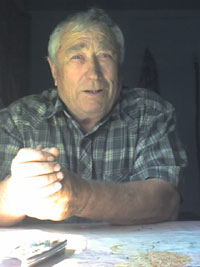 Born 1935.
Born 1935.
The Schleining family live on the river Volga, in the Engels District, Saratow Region, in the village of Knaduselsk (? Gnadendorf?). About 10 – 15 kms away their were a number of Russian villages. There were three brothers. The mother’s name was Yekaterina Filippovna; the father died, when they still lived on the banks of the Volga. There was a 99 year-old grandmother, as well.
They were deported in September 1941. The village was surrounded by soldiers with machine pistols (?, more likely these were guns – AB); the village people were informed about how much time they would have to get prepared for the trip, to pack all their belongings. They drove the cattle behind the enclosure of the school building, where they received a receipt for the delivered animals. They were promised the same kind of cattle upon arrival in their new place of residence. (This, in fact, came true, soon after they had reached the Krasnoyarsk Region, but the cow was not much good; it was seriously bleeding, but nevertheless gave a little milk).
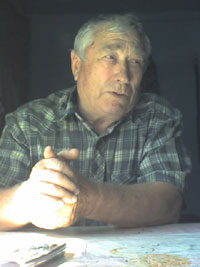 They loaded everything they intended to take along on hay carts, harnessed
camels, oxen or horses and in this way went all the way up to the narrow-gauge
railway line. They had packed only a few things to take along.
They loaded everything they intended to take along on hay carts, harnessed
camels, oxen or horses and in this way went all the way up to the narrow-gauge
railway line. They had packed only a few things to take along.
Then they had to change the means of transport: their trip was to continue by
train, in freight cars. The most crucial thing was to find some little space
where to sit down. None of them died during the train ride. The mother had taken
along a whole paleful of cutlets (before leaving their home they had managed to
butcher a bull); it was amply soused with oil to avoid
an early spoilage. They were en route for about one week.
They arrived in Galanino in September. All in all about 40-50 families were unloaded there. The place of destination of the next party of resettlers was Sotino. The first snow had already fallen. this was very unusual for those, who had spent all their live in the Volga area. They were crying and sobbing, consistenely repeating the questions: “What’s that supposed to mean? Why did they take us to such a place?”
They were quartered with local residents. The Schleiming family was put up by a widow (whose husband had been killed at the front), but the information about his death were wrong: he returned home after the war.
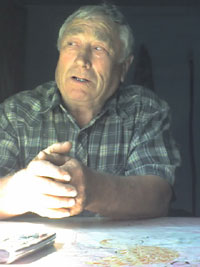 They somehow overwintered there and in the springtime began to build
themselves dugouts.
They somehow overwintered there and in the springtime began to build
themselves dugouts.
The was enough building material available in the surrounding area. The elder
brother was immediately mobilized into the trudarmy, while they sent the second
brother to the school of tractorists (he was much too young to work in the
labour army). The uncle was led up to the trudarmy, as well; he died there:
someone had clandestinely placed a piece of brade under his cushion, the inmates
carried out a searching, detected the bread and then welted the uncle, until he
showed no more signs of life.
For about three-four years there was always a spark of hope that they might be arrested and sent home, but then it became evident that something of the kind would not happen. In 1949 they were transferred to Molotovo, where the mother started to work for the kolkhoz farm; she had to mow wheat by hand. She was a good worker, hence additionally received 5 kgs of oat bran per week.
They used it to cook kissel (sweet-and-sour food generally made from fruit juice and flour; translator`s note). It had a wonderful taste (probably due to the fact that they were hungry). They did not receive any bread: there were some legal requirements that one had to work about 80-100 days per year for the kolkhoz farm. in order to be entitled to 300 grams of cereals for one work-day unit. Unfortunately, the kolkhoz farm had just started operations, and this was why they received so little food at that time.
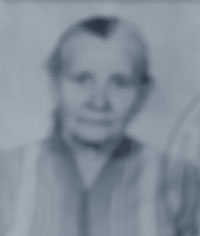 The mother was additionally working for a couple of local residents – they
cultivated flax and hamp, from which they produced cords and ropes; they worked
on the loom and sewed linen shirts.
The mother was additionally working for a couple of local residents – they
cultivated flax and hamp, from which they produced cords and ropes; they worked
on the loom and sewed linen shirts.
Before leaving the Volga Region they had managed to load a big long case clock on the hay cart, which they were later forced to exchange against foodstuffs. Afterwards, the mother kept crying for a long time in grief and despair.
They had nothing to wear; that is why, from the month of April, he had to go to school bare-footed. He warmed his ice-cold feet by walking through fresh stall manure – his frozen stiff feet burned like fire. He managed to reach the school-building within 5 minutes by running as fast as he could.
The children had no exercise books, they had to write on various kinds of blanks – there were a lot of them on the kolkhoz farm. He somehow succeeded to finish two terms; his mother did not insist that he continued to go to school, for the conditions of living were just too bad. Later he went to a vocational school joined to the factory, where he received clothes and victuals, as well. He was working as a locksmith for more than 33 years.
His mother died in Momotovo from cirrhosis of the liver in 1958.
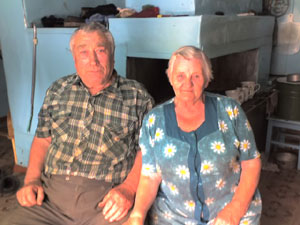 His two brothers left the country for Germany soon after the beginning of the
perestorika; they have already died there. A. Y. once went there for a visit;
they said that they would like him to remove there, too, but he refused to
follow their proposal.
His two brothers left the country for Germany soon after the beginning of the
perestorika; they have already died there. A. Y. once went there for a visit;
they said that they would like him to remove there, too, but he refused to
follow their proposal.
He got married to a Volga-German woman; her maidenname was Gaun. He has 5 children, 12 grandchildren, 7 great-granddaughters and 1 great-grandson.
Interviewed by Alsu Akhmadeeva, Maria Pichuyeva und Sergei Kilin.
(AB – comments by Aleksei Babiy, Krasnojarsk „Memorial“
Sixth expedition of history and human rights, Momotovo 2009